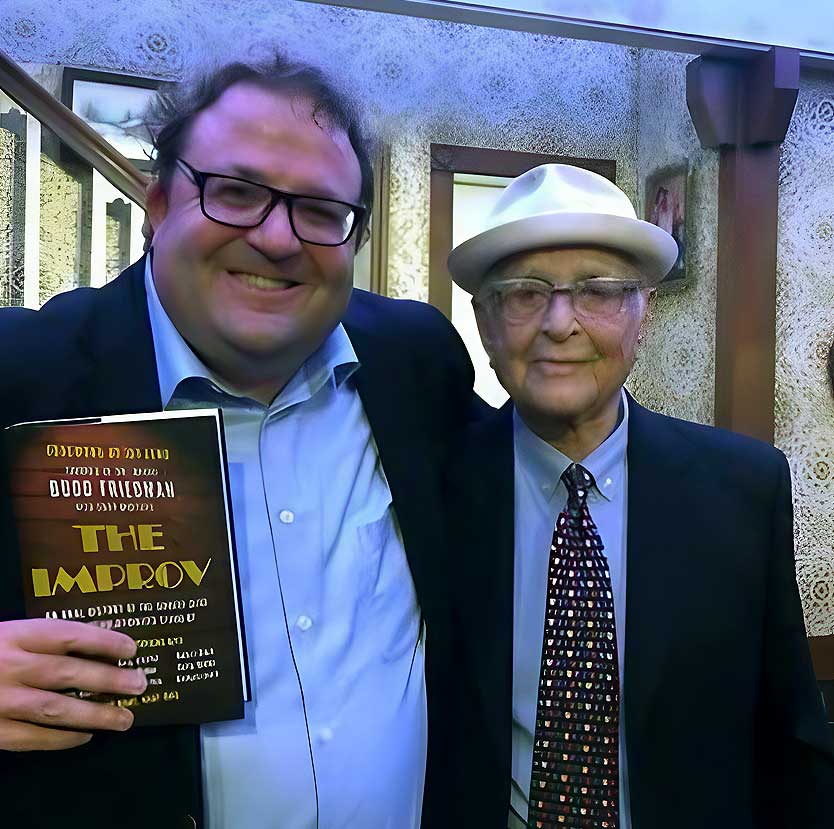in-depth
biography of
TV legend
Norman Lear
out NOW!

In December 1971, nearly one year after All in the Family premiered, viewers discovered for the first time how Archie and Edith Bunker met. It was revealed in the season-two episode “Cousin Maude’s Visit” that became the origin for the eponymous hit spin-off starring Bea Arthur. The premise was that the entire Bunker household got sick with flu, and as Edith’s liberal feminist first cousin Maude Findlay, whom Archie despised, came to take care of them, Edith, as only she could, told the meandering story of how Archie, trying to get her attention, stuck his hand into her sundae at an ice cream parlor, and forever captured her heart. Later recounted again almost verbatim in the final scene of the·season-8 flashback episode “Mike and Gloria Meet,” it also illustrates just one example of Norman’s uncanny knack for mining deeply into the recesses of his past, and with tongue firmly planted in cheek, turning it into comedy gold. From “stifle,” “dingbat,” and “meathead” to Archie’s beer-stained easy chair, countless aspects from his own life can be found sprinkled throughout his signature sitcom and other shows. In this hilarious bit about how Archie and Edith became a couple, he masterfully played off the circumstances under which his own parents Herman and Jeanette Lear originally got together some fifty years earlier.
Early Childhood and Youth
But in a very real sense, it was also a prophetic metaphor for how Norman quickly learned to use comedy to survive a childhood that was marred by pain, poverty, and often desperation from a very young age. The peculiar tale of how his parents crossed paths occurred sometime in the summer of 1921 at a New Haven, Connecticut, ice cream parlor. Like Archie did with Edith, Herman-in his quest to get Jeanette, who was there on another date, to notice him-thrust his hand into her banana split. Following a brief eight-week courtship, they were married that September. Eleven months later, on July 27, 1922, their first and only son Norman Milton Lear entered this world at New Haven Hospital. Three years after that, on October 25, 1925, Herman and Jeanette became the parents of a daughter, Claire.
An aspiring jazz singer who later performed in nursing homes and was the model for Gloria on All in the Family, Claire would spend most of her life in the Connecticut area, where she was a housewife married for sixty years to a metal worker named Richard Brown and the mother of three children, deliberately eschewing the spotlight of her famous older brother. Though they were never estranged, they were never particularly close either. In 1997, Norman told the Hartford Courant that he was sometimes “exasperated by her and by her inability to grasp subtleties because she was unaware of the greater events and forces in the world,” adding that “in some ways she is as unsophisticated a person as I’ve ever met.”1 During the earliest years of his life, the family lived at 45 Mead Street in downtown New Haven, where his mother, Jeanette, allegedly dropped three month-old Norman on his head while she was bathing him in the kitchen sink, leaving him there alone as she ran next door to a neighbor to get help. “Over the years, this incident seemed increasingly funny to her,” he said in his 2014 memoir Even This I Get to Experience. “It became a kind of set piece in her life story.”


“Tripp Whetsell’s soup-to-nuts biography of TV legend Norman Lear hits all the right notes in presenting this most remarkable, rags-to-riches life. Well researched and extremely readable, it will appeal to fans of Mr. Lear’s sitcoms and comedy of all types. I highly recommend it.”
Marc Eliot
The New York Times bestselling author
“In spotlighting a litany of social issues seldom discussed in nighttime television entertainment—bigotry, racism, homophobia, sexism (and the first toilet flush heard ‘round the world)—Lear turned the mirror on the American public and shockingly showed them the full ugliness of their reflection. Whetsell’s painstaking biography of the man behind it all—including such revolutionary sitcoms as Maude, The Jeffersons, and Mary Hartman, Mary Hartman—explains what shaped Lear’s lifelong advocacy and determination and the sheer miracle of his television reign.”
Alanna Nash
Author of The Colonel: The Extraordinary Story of Tom Parker and Elvis Presley and Golden Girl: The Story of Jessica Savitch
“A remarkably dense biography that does justice to one of television’s most remarkable figures, Norman Lear: His Life & Times is a must.”
Kliph Nesteroff
Author of The Comedians: Drunks, Thieves, Scoundrels and the History of American Comedy and Outrageous: A History of Showbiz and the Culture Wars.
“Whetsell knows where the funny bones are buried. Through the lens of Norman Lear’s life, he gives us the very history of television comedy. A monumental work, Norman Lear is essential reading for sitcom aficionados and casual fans alike.”
Brian McDonald
Author of Last Call at Elaine’s and Five Floors Up

About the author
Tripp Whetsell is the author of The Improv: An Oral History of the Comedy Club That Revolutionized Stand-Up (with founder Bud Friedman and a Foreword by Jay Leno), which was named one of the best comedy books of 2017 by ABC News, The New York Times and the New York Post. He is an adjunct media studies professor at Emerson College in Boston. As an entertainment journalist, he has covered TV, film, comedy and other aspects of popular culture for more than two decades. His articles have appeared in Vulture, The New York Times, The Los Angeles Times, VanityFair.com, The Wall Street Journal, TV Guide, The Hollywood Reporter, Closer Weekly, the New York Post, New York Daily News and The Boston Globe, among others. He lives in New York City and Westhampton Beach, Long Island. Norman Lear: His Life & Times is his fourth book.








